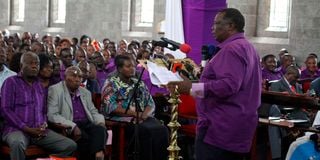Church loved by labour unions to mark centenary

In this file photo, Cotu secretary General Francis Atwoli speaking at St Stephen ACK Church along Jogoo Road during the Cotu-K prayers day.
The branch of the Anglican Church of Kenya (ACK) that at one point used to serve Africans as Europeans worshipped at the All Saints Cathedral is celebrating its 100th anniversary this month.
The ACK St Stephen’s Cathedral, located along Jogoo Road in Nairobi, will be holding its centenary celebrations on July 30 and it has planned many activities to mark the milestone.
The cathedral started in the early 1900s as a temporary structure at the heart of Nairobi. This was long before the All Saints’ Cathedral was constructed.
“It was the first Anglican Church to be constructed in Nairobi. Before it was built, worshipers held their services at the Railway Institute,” reads an article the church shared with the Sunday Nation.
The structure was nicknamed the Tin Tabernacle as it was made of timber and corrugated iron.
Also read: 100 years of the iconic All Saints Cathedral
In 1923, as its membership grew, the construction of a permanent building started along Parliament Road. It stood where Parliament Buildings are situated today.
The church was relocated to its Jogoo Road location in 1953.
“Once (the Jogoo Road one) was complete, the colonial government demolished the (Parliament Road) church using dynamite in 1953,” adds the article.
“From its humble beginnings on Jackson Road (now Parliament Road) to its monumental presence on Jogoo Road, it has served generations of Christians well. It will remain a church with great sentimental value not only to Christianity in Kenya but also in the East African region,” it further reads.
Among its many legacies is its choir, and one instance where it made its mark was in 1978.
On August 22 of that year, one of the first tasks that faced the head of civil service, Geoffrey Kareithi, was to ensure that a presidential-class funeral programme was put in place for the country’s founding president.
He had just received confirmation from the Coast provincial commissioner that President Jomo Kenyatta had passed away.
Years later, as he would divulge to a friend, Kareithi placed a call to St Stephen’s and spoke to the provost.
Famous choir
He wanted the nationally famous choir from that church under the legendary Darius Mbela to compose dirges and soothing songs that would calm an anxious and fearful nation.
The performance at the funeral was just one of the occasions when St Stephen’s has been in the limelight.
Over the years, it has become synonymous with the Labour Day celebrations, with the prayer service for the day set aside to honour workers always being held there.
Rev Canon Paul Mwangi is the provost of St Stephen’s.
He explains that the relocation of the church happened during the country’s formative years.
“This was when the clamour for independence and self-rule was building momentum. The congregation at the Jackson Road Church was majorly (made up of) natives, especially after All Saints Church was begun in 1917. Therefore, the labour unions and political leaders found a ready congregation and home at St Stephen’s,” he says.
“Remember that by then, the congregation was composed of middle-class citizens employed by government entities and parastatals. Since then, we have continued to host the Kenyan Workers Prayers held every last Sunday of the month of April before Labour Day celebrations. This service is spearheaded by the umbrella body, the Central Organisation of Trade Unions,” he says.
The article from the church reads: “The church became a significant landmark in Eastlands. It served a vibrant congregation made up of civil servants and workers from the East African Railways company who lived in various estates such as Makongeni, Government Quarters, Bahati, Mbotela, Landimawe, Muthurwa, Shauri Moyo, Makadara, and Maringo Estate. Eastlands was once a blue-collar neighbourhood with a solid middle-class that included African legislators, senior clerks and fresh university graduates from Uganda’s Makerere. By the standards of the 1950s, this congregation was considered quite elite.”
Rev Canon Mwangi says over the years, the church has strived to transform the lives of those living around it.
“This congregation has produced a number of clergy, some who are now retired and a good number that are currently in service within and outside the diocese. We also carry out mentorship programmes for our children with a special interest to the initiation rites for boys where we seek to mould the character of these young men and prepare them for taking responsibilities,” he says.
Perhaps the most famous product of the cathedral was the late Mitch Odero, who rose in Kenya’s media circles to become News Editor at the Daily Nation and later Editor-in-Chief at Kenya Times and the Standard.
Mitch was a star footballer, a youth boxing champion as well as a chorister and a guitarist at St Stephen’s.






